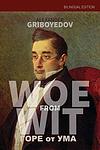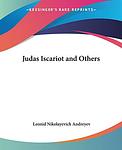The Greatest Russian "Plays" Books of All Time
Click to learn how this list is calculated.
This list represents a comprehensive and trusted collection of the greatest books. Developed through a specialized algorithm, it brings together 300 'best of' book lists to form a definitive guide to the world's most acclaimed books. For those interested in how these books are chosen, additional details can be found on the rankings page.
Genres
Plays are a category of literature that consists of written works intended for performance on stage. They typically feature dialogue between characters and are structured into acts and scenes. Plays can be comedic, tragic, or a combination of both, and often explore themes such as love, power, and morality. They are meant to be performed by actors in front of an audience, and can be enjoyed both as written works and as live performances.
Countries
Date Range
Reading Statistics
Click the button below to see how many of these books you've read!
Download
If you're interested in downloading this list as a CSV file for use in a spreadsheet application, you can easily do so by clicking the button below. Please note that to ensure a manageable file size and faster download, the CSV will include details for only the first 500 books.
Download-
1. The Cherry Orchard by Anton Chekhov
"The Cherry Orchard" is a classic play about an aristocratic Russian woman and her family as they return to their family estate, which includes a large and well-known cherry orchard. The family is on the brink of financial ruin and the estate is slated to be auctioned off. Despite various attempts to save their beloved home and orchard, they are ultimately unable to prevent the sale. The play is a poignant reflection on the changing social order and the decline of the aristocracy in Russia at the turn of the 20th century.
-
2. Three Sisters by Anton Chekhov
"Three Sisters" is a play that revolves around the lives of three sisters, Olga, Masha, and Irina, who live in a provincial Russian town and yearn for their former life in Moscow. The story explores their relationships, dreams, and disappointments, as well as their interactions with the military officers stationed nearby. The narrative is a poignant exploration of love, loss, and the relentless passage of time, highlighting the human struggle for meaning and happiness.
-
3. The Seagull by Anton Chekhov
The play revolves around the complex interplay of love, art, and the pursuit of happiness among a group of characters gathered at a Russian country estate. Central to the narrative is a young aspiring playwright, who yearns for the recognition of his art and the love of a woman, an actress infatuated with a successful writer. The story unfolds as these characters grapple with unrequited affections, artistic ambitions, and the crushing weight of societal expectations, leading to a tapestry of human desires, disillusionment, and the search for meaning in life.
-
4. The Government Inspector by Nikolai Gogol
The play is a satirical comedy that exposes the corruption and foolishness of the bureaucracy in a small Russian town. When officials mistake a lowly civil servant for a feared government inspector traveling incognito, they fall over themselves to cover up their town's numerous misdeeds. The visitor exploits the situation for personal gain, accepting bribes and enjoying the sycophantic hospitality of the town's officials, who are oblivious to his true identity. The story unfolds with a series of comedic misunderstandings and ironic twists, culminating in a final revelation that leaves the townspeople facing the consequences of their deception and moral laxity.
-
5. Uncle Vanya by Anton Chekhov
"Uncle Vanya" is a play that explores the themes of existential boredom and human folly through the story of an elderly professor and his young wife visiting their rural estate run by the professor's brother-in-law, Vanya, and daughter, Sonya. The visit disrupts the monotonous life of the estate, leading to emotional chaos, unrequited love, and a failed murder attempt. The play ends with the departure of the professor and his wife, leaving Vanya and Sonya to return to their life of drudgery, finding solace in the hope of a better life in the afterlife.
-
6. Boris Godunov by Alexander Pushkin
The narrative centers on the tumultuous political landscape of Russia following the death of Tsar Ivan the Terrible. It delves into the ascent of Boris Godunov to the Russian throne amidst power struggles, rumors, and the specter of a pretender claiming to be the rightful heir. The story explores themes of ambition, guilt, and the heavy burden of leadership as Boris grapples with his conscience and the consequences of his actions in a period marked by political intrigue, betrayal, and the quest for legitimacy in a nation on the brink of turmoil.
-
7. The Lower Depths by Maxim Gorky
The book is a stark depiction of the lives of the impoverished and dispossessed at the bottom of the Russian social ladder in the early 20th century. Set in a squalid shelter, it presents a group of destitute individuals from various backgrounds—thieves, prostitutes, and the down-and-out—who share their stories and philosophies as they grapple with the harsh realities of poverty and survival. The narrative delves into themes of human suffering, the struggle for dignity, and the elusive nature of truth, offering a grim commentary on the social conditions of the time and the human condition itself.
-
8. Woe From Wit by Alexander Griboyedov
The play is a sharp satire on the social and political life of 19th-century Russia, depicting the clash between progressive ideas and the inertia of a society anchored in old-fashioned conventions and protocols. The protagonist, a witty and intellectual young man, returns to Moscow from abroad, only to find himself entangled in the superficial and hypocritical world of Moscow's elite. His sharp tongue and criticisms of the societal norms lead to misunderstandings and a tragic series of events, reflecting the author's commentary on the futility of intelligence and wit in a society that values appearance over substance.
-
9. The Little Tragedies by Alexander Pushkin
"The Little Tragedies" is a collection of four dramatic poems that delve into themes of greed, envy, lust, and the destructive nature of human passions. Each poem presents a compact narrative focusing on a protagonist who succumbs to a fatal flaw, leading to their downfall. The characters, drawn from various historical and fictional sources, are placed in intense, morally complex situations that ultimately bring about tragedy through their own actions. The work is a profound exploration of the darker aspects of human nature and the consequences of unchecked desires, showcasing the author's skill in blending poetic language with dramatic intensity.
-
10. Scenes From The Past by Alexander Sukhovo-Kobylin
"Scenes from the Past" is a trilogy of satirical plays that delve into the corruption and injustices of Russian society during the 19th century. Through a blend of dark humor and tragedy, the narrative follows the protagonist, a young nobleman, as he navigates a treacherous legal system and the decadent aristocracy. The plays critique the bureaucratic nightmare and moral decay of the time, exposing the absurdities of the judicial process and the societal norms that allow the powerful to exploit the weak. The work is a scathing commentary on the author's own experiences with the law and a timeless reflection on the universal themes of power, greed, and injustice.
-
11. Judas Iscariot by Leonid Andreyev
The book presents a reimagining of the character of Judas Iscariot, traditionally known as the betrayer of Jesus Christ. It delves into the psychological and moral complexities of Judas, exploring his inner turmoil, motivations, and the factors that may have led him to commit the act of betrayal. The narrative seeks to humanize Judas, offering a nuanced perspective that challenges the conventional vilification he has received throughout history. Through this character study, the book examines themes of guilt, redemption, and the nature of evil, ultimately raising questions about free will and the role of individuals within the grander schemes of destiny and divine plans.
-
12. The Major Plays by Anton Chekhov
This collection brings together the most significant works of a master playwright whose stories unfold against the backdrop of Russian society at the turn of the 20th century. The plays are rich with complex characters, nuanced relationships, and social commentary, exploring themes of unrequited love, dreams versus reality, the passage of time, and the search for meaning in everyday life. The playwright's signature blend of tragedy and comedy, combined with a subtle use of symbolism and a focus on character development, has cemented these works as timeless explorations of human nature and the societal pressures that shape our lives.
-
13. The Storm by Aleksandr Ostrovsky
"The Storm" is a classic Russian drama set in a small provincial town, where the central character, a young woman trapped in a stifling and oppressive marriage, struggles against the rigid social norms and expectations of her community. The play explores themes of personal freedom, the clash between individual desires and societal conventions, and the destructive power of nature, both in the literal sense with an impending storm and metaphorically in the emotional turmoil experienced by the characters. As the narrative unfolds, the protagonist's quest for love and happiness leads to tragic consequences, reflecting the broader conflict between progressive ideas and traditional values in 19th-century Russia.
-
14. The Forest by Alexander Ostrovsky
"The Forest" is a classic Russian play that intertwines themes of love, greed, and the generational clash between old and new values. Set in a rural 19th-century Russian village, the story revolves around a wealthy, miserly widow who owns a large estate and her nephew, a struggling but idealistic playwright. When a pair of itinerant actors arrives in the village, their presence sets off a series of events that expose the hypocrisy and corruption of the rural gentry and merchant class. Through a blend of comedy and drama, the play critiques the societal norms of the time, revealing the characters' true natures and exploring the transformative power of art and integrity.
Reading Statistics
Click the button below to see how many of these books you've read!
Download
If you're interested in downloading this list as a CSV file for use in a spreadsheet application, you can easily do so by clicking the button below. Please note that to ensure a manageable file size and faster download, the CSV will include details for only the first 500 books.
Download











